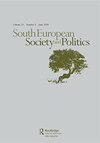希腊的政治两极分化:普雷斯帕协议、左/右对抗和民族主义/民粹主义联系
IF 4.6
1区 社会学
Q1 POLITICAL SCIENCE
引用次数: 9
摘要
2018年6月《普雷斯帕协议》签署后,马其顿国名问题成为希腊政治议程上最突出的话题,引发了一场特殊的政治对抗,并促进了政党的重组,最终导致了政府更迭。本文分析了2018年1月至2019年7月全国大选期间关于该问题的政治话语和公开辩论,以及民意调查和选举结果,探讨了导致左/右政治两极分化升级的条件,以牺牲较小的中间派政党为代价。有人认为,政治对抗是建立在先前的政治分裂之上的(尽管民粹主义/反民粹主义轴心现在被逆转了)。通过围绕所谓的“国家威胁”动员公众情绪,围绕马其顿国名问题的两极分化对希腊右翼来说比左翼要成功得多。本文章由计算机程序翻译,如有差异,请以英文原文为准。
Political Polarisation in Greece: The Prespa Agreement, Left/Right Antagonism and the Nationalism/Populism Nexus
ABSTRACT Following the signing of the Prespa Agreement in June 2018, the Macedonian name issue became the most prominent topic on the Greek political agenda, catalysing an exceptional political confrontation and contributing to the realignment of political parties and eventually to government change. Analysing the political discourse and public debate on the issue from January 2018 until the July 2019 national elections, as well as opinion polls and electoral results, the paper explores the conditions leading to the escalation of political polarisation on the left/right axis, at the expense of smaller centrist parties. It is argued that political antagonism was built on the previous political cleavage (although the populist/anti-populism axis was now reversed). By mobilising public emotions around an alleged ‘national threat’, the polarisation around the Macedonian name issue proved far more successful for the Greek right than for the left.
求助全文
通过发布文献求助,成功后即可免费获取论文全文。
去求助
来源期刊

South European Society and Politics
Multiple-
CiteScore
5.80
自引率
21.20%
发文量
14
期刊介绍:
A leading point of reference for scholars of Southern Europe, South European Society and Politics promotes both comparative and inter-disciplinary analyses, as well as offering innovative single county and sub-national studies. The journal acts as a forum for social, economic, cultural, contemporary historical and political approaches to research on the region, and is particularly keen to sponsor policy–focused studies in all these disciplines. The journal publishes research articles; South European Atlas with election reports and articles on other subjects of topical interest, and an extensive book reviews section, including both review articles and individual book reviews.
 求助内容:
求助内容: 应助结果提醒方式:
应助结果提醒方式:


